Reflective Journal: HLSC641 Introduction to Health Sciences Research
VerifiedAdded on 2023/04/04
|5
|1026
|192
Journal and Reflective Writing
AI Summary
This reflective journal entry details a student's experience and learning in the HLSC641 Introduction to Health Sciences Research unit. The reflection covers various topics including inductive and deductive approaches to research, ethics in research practice (respect for privacy, informed consent, confidentiality, and anonymity), quantitative research paradigms, systematic literature search methods (PICO, databases, keywords, and endnote exporting), and data analysis techniques (qualitative and quantitative). The student highlights the development of critical thinking, research, communication, data collection, and data analysis skills, emphasizing their importance in becoming an effective public health professional. The reflection concludes with an appreciation for the acquired skills and their potential application in future practice, demonstrating an understanding of research methodologies and ethical principles in public health research.
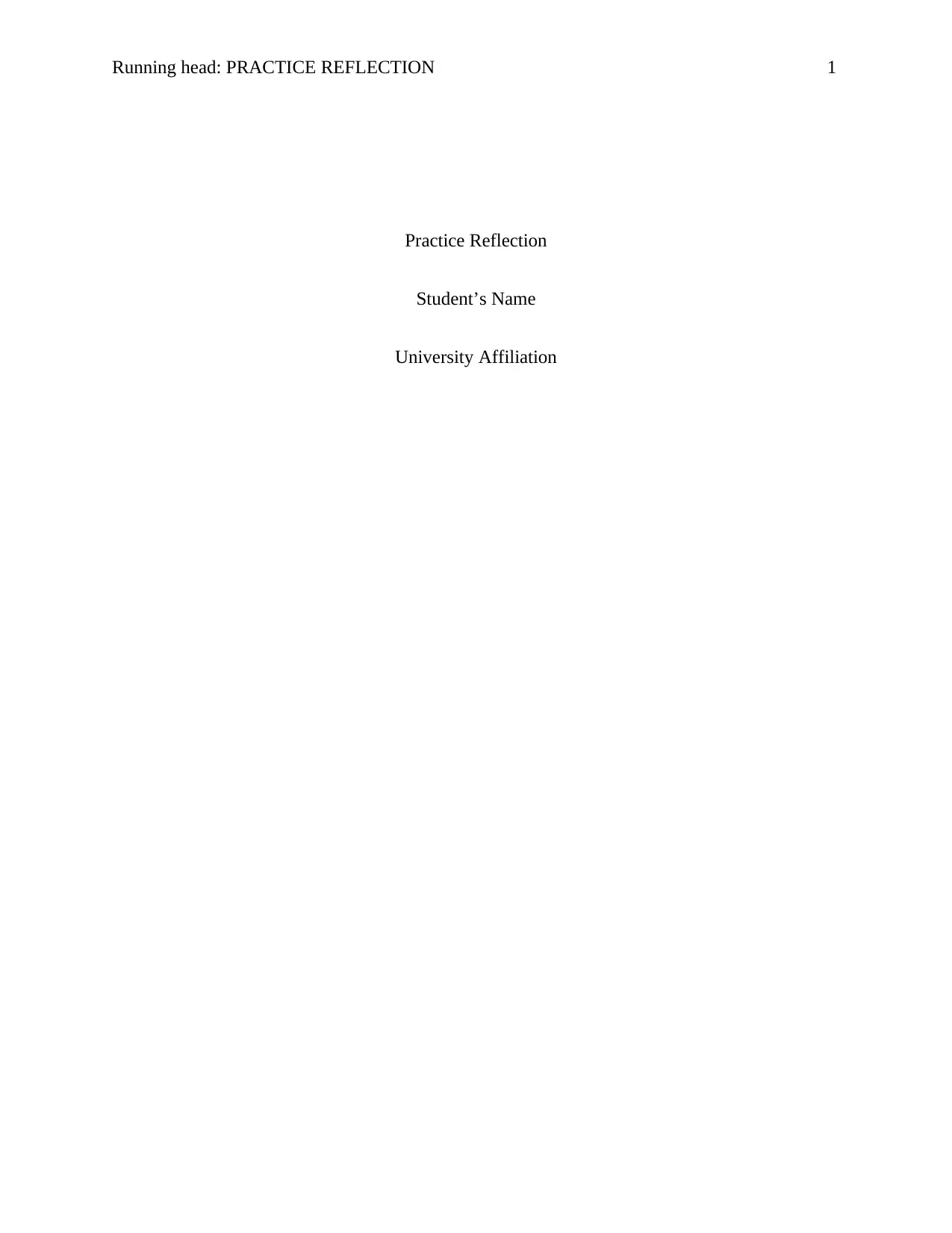
Running head: PRACTICE REFLECTION 1
Practice Reflection
Student’s Name
University Affiliation
Practice Reflection
Student’s Name
University Affiliation
Paraphrase This Document
Need a fresh take? Get an instant paraphrase of this document with our AI Paraphraser
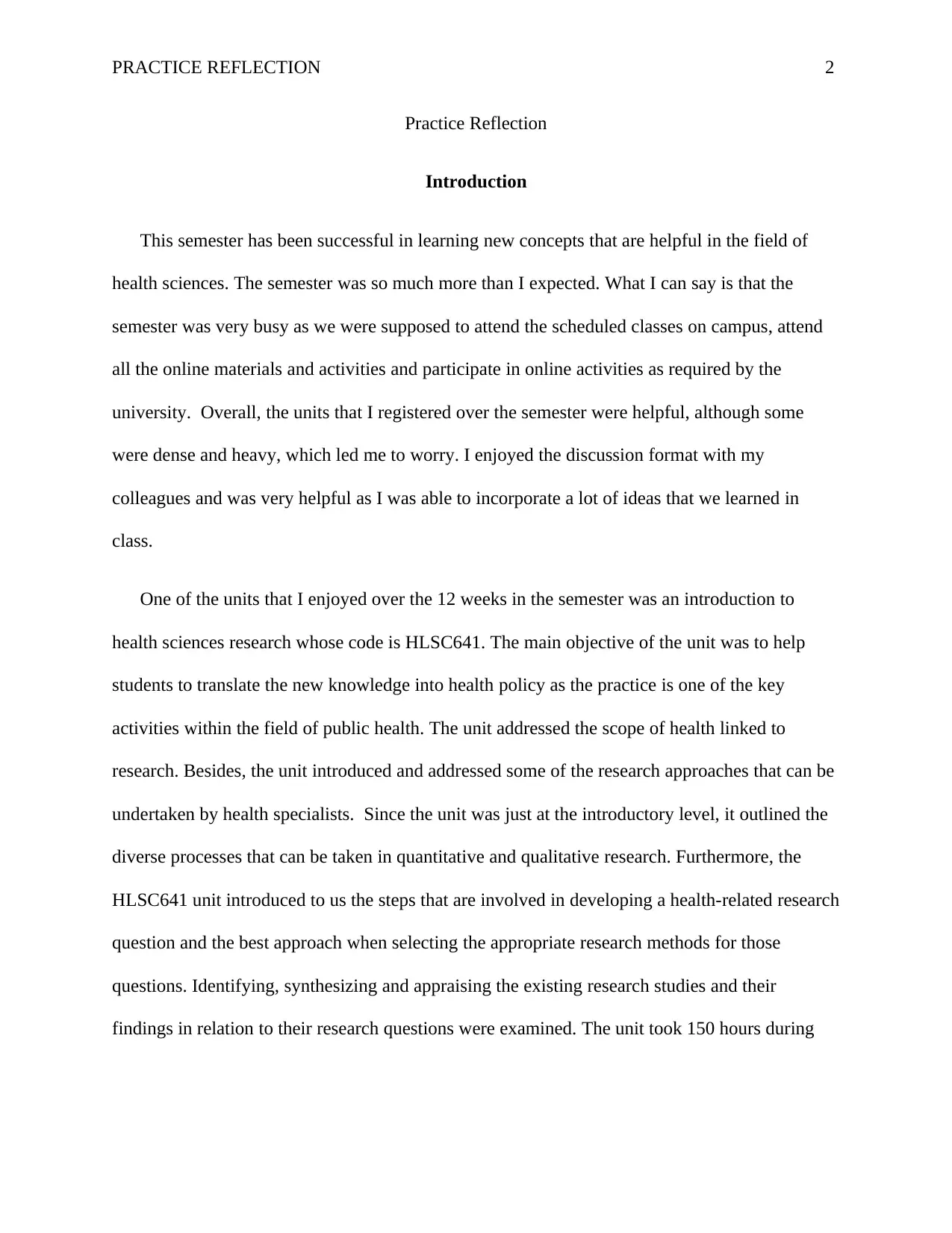
PRACTICE REFLECTION 2
Practice Reflection
Introduction
This semester has been successful in learning new concepts that are helpful in the field of
health sciences. The semester was so much more than I expected. What I can say is that the
semester was very busy as we were supposed to attend the scheduled classes on campus, attend
all the online materials and activities and participate in online activities as required by the
university. Overall, the units that I registered over the semester were helpful, although some
were dense and heavy, which led me to worry. I enjoyed the discussion format with my
colleagues and was very helpful as I was able to incorporate a lot of ideas that we learned in
class.
One of the units that I enjoyed over the 12 weeks in the semester was an introduction to
health sciences research whose code is HLSC641. The main objective of the unit was to help
students to translate the new knowledge into health policy as the practice is one of the key
activities within the field of public health. The unit addressed the scope of health linked to
research. Besides, the unit introduced and addressed some of the research approaches that can be
undertaken by health specialists. Since the unit was just at the introductory level, it outlined the
diverse processes that can be taken in quantitative and qualitative research. Furthermore, the
HLSC641 unit introduced to us the steps that are involved in developing a health-related research
question and the best approach when selecting the appropriate research methods for those
questions. Identifying, synthesizing and appraising the existing research studies and their
findings in relation to their research questions were examined. The unit took 150 hours during
Practice Reflection
Introduction
This semester has been successful in learning new concepts that are helpful in the field of
health sciences. The semester was so much more than I expected. What I can say is that the
semester was very busy as we were supposed to attend the scheduled classes on campus, attend
all the online materials and activities and participate in online activities as required by the
university. Overall, the units that I registered over the semester were helpful, although some
were dense and heavy, which led me to worry. I enjoyed the discussion format with my
colleagues and was very helpful as I was able to incorporate a lot of ideas that we learned in
class.
One of the units that I enjoyed over the 12 weeks in the semester was an introduction to
health sciences research whose code is HLSC641. The main objective of the unit was to help
students to translate the new knowledge into health policy as the practice is one of the key
activities within the field of public health. The unit addressed the scope of health linked to
research. Besides, the unit introduced and addressed some of the research approaches that can be
undertaken by health specialists. Since the unit was just at the introductory level, it outlined the
diverse processes that can be taken in quantitative and qualitative research. Furthermore, the
HLSC641 unit introduced to us the steps that are involved in developing a health-related research
question and the best approach when selecting the appropriate research methods for those
questions. Identifying, synthesizing and appraising the existing research studies and their
findings in relation to their research questions were examined. The unit took 150 hours during
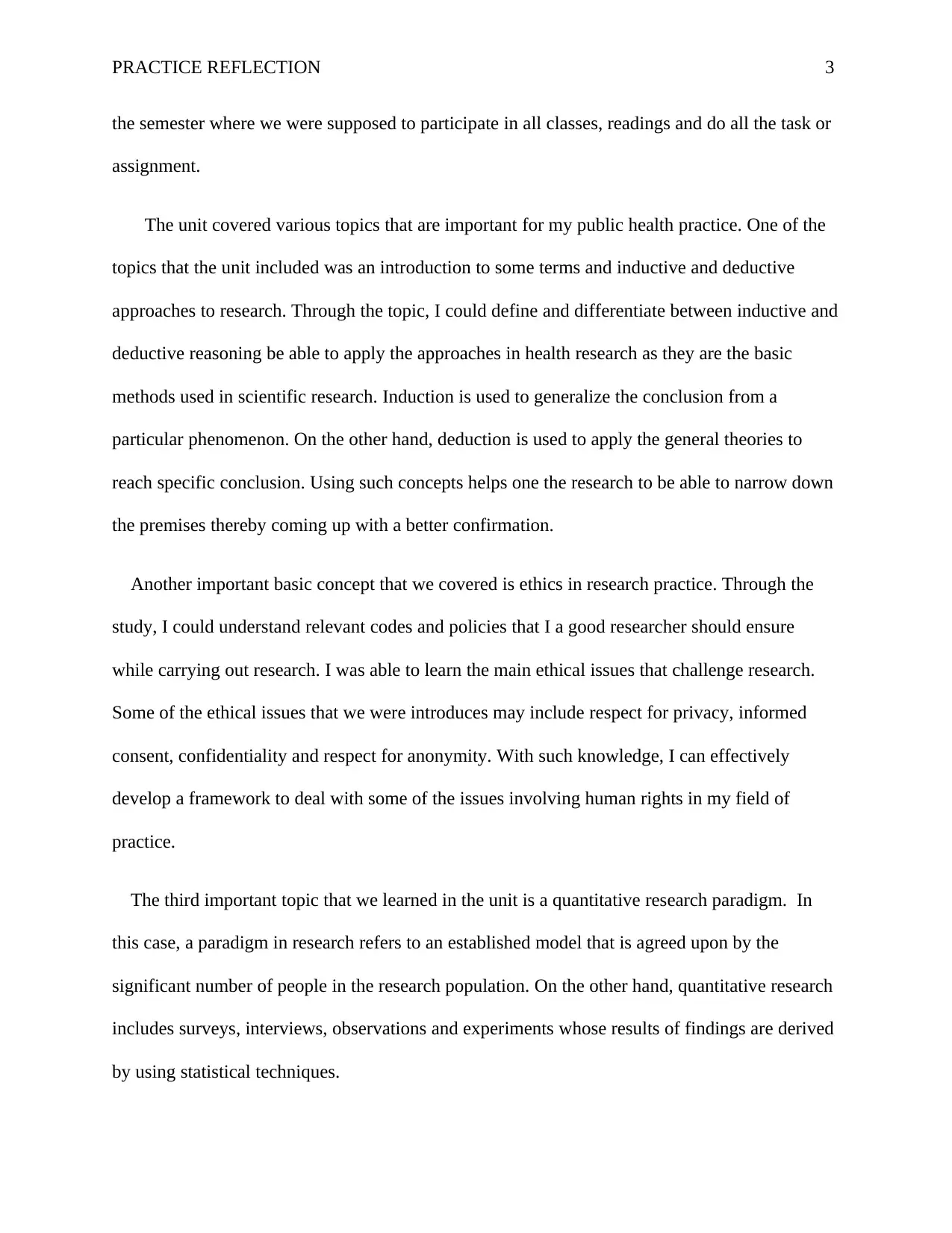
PRACTICE REFLECTION 3
the semester where we were supposed to participate in all classes, readings and do all the task or
assignment.
The unit covered various topics that are important for my public health practice. One of the
topics that the unit included was an introduction to some terms and inductive and deductive
approaches to research. Through the topic, I could define and differentiate between inductive and
deductive reasoning be able to apply the approaches in health research as they are the basic
methods used in scientific research. Induction is used to generalize the conclusion from a
particular phenomenon. On the other hand, deduction is used to apply the general theories to
reach specific conclusion. Using such concepts helps one the research to be able to narrow down
the premises thereby coming up with a better confirmation.
Another important basic concept that we covered is ethics in research practice. Through the
study, I could understand relevant codes and policies that I a good researcher should ensure
while carrying out research. I was able to learn the main ethical issues that challenge research.
Some of the ethical issues that we were introduces may include respect for privacy, informed
consent, confidentiality and respect for anonymity. With such knowledge, I can effectively
develop a framework to deal with some of the issues involving human rights in my field of
practice.
The third important topic that we learned in the unit is a quantitative research paradigm. In
this case, a paradigm in research refers to an established model that is agreed upon by the
significant number of people in the research population. On the other hand, quantitative research
includes surveys, interviews, observations and experiments whose results of findings are derived
by using statistical techniques.
the semester where we were supposed to participate in all classes, readings and do all the task or
assignment.
The unit covered various topics that are important for my public health practice. One of the
topics that the unit included was an introduction to some terms and inductive and deductive
approaches to research. Through the topic, I could define and differentiate between inductive and
deductive reasoning be able to apply the approaches in health research as they are the basic
methods used in scientific research. Induction is used to generalize the conclusion from a
particular phenomenon. On the other hand, deduction is used to apply the general theories to
reach specific conclusion. Using such concepts helps one the research to be able to narrow down
the premises thereby coming up with a better confirmation.
Another important basic concept that we covered is ethics in research practice. Through the
study, I could understand relevant codes and policies that I a good researcher should ensure
while carrying out research. I was able to learn the main ethical issues that challenge research.
Some of the ethical issues that we were introduces may include respect for privacy, informed
consent, confidentiality and respect for anonymity. With such knowledge, I can effectively
develop a framework to deal with some of the issues involving human rights in my field of
practice.
The third important topic that we learned in the unit is a quantitative research paradigm. In
this case, a paradigm in research refers to an established model that is agreed upon by the
significant number of people in the research population. On the other hand, quantitative research
includes surveys, interviews, observations and experiments whose results of findings are derived
by using statistical techniques.
⊘ This is a preview!⊘
Do you want full access?
Subscribe today to unlock all pages.

Trusted by 1+ million students worldwide
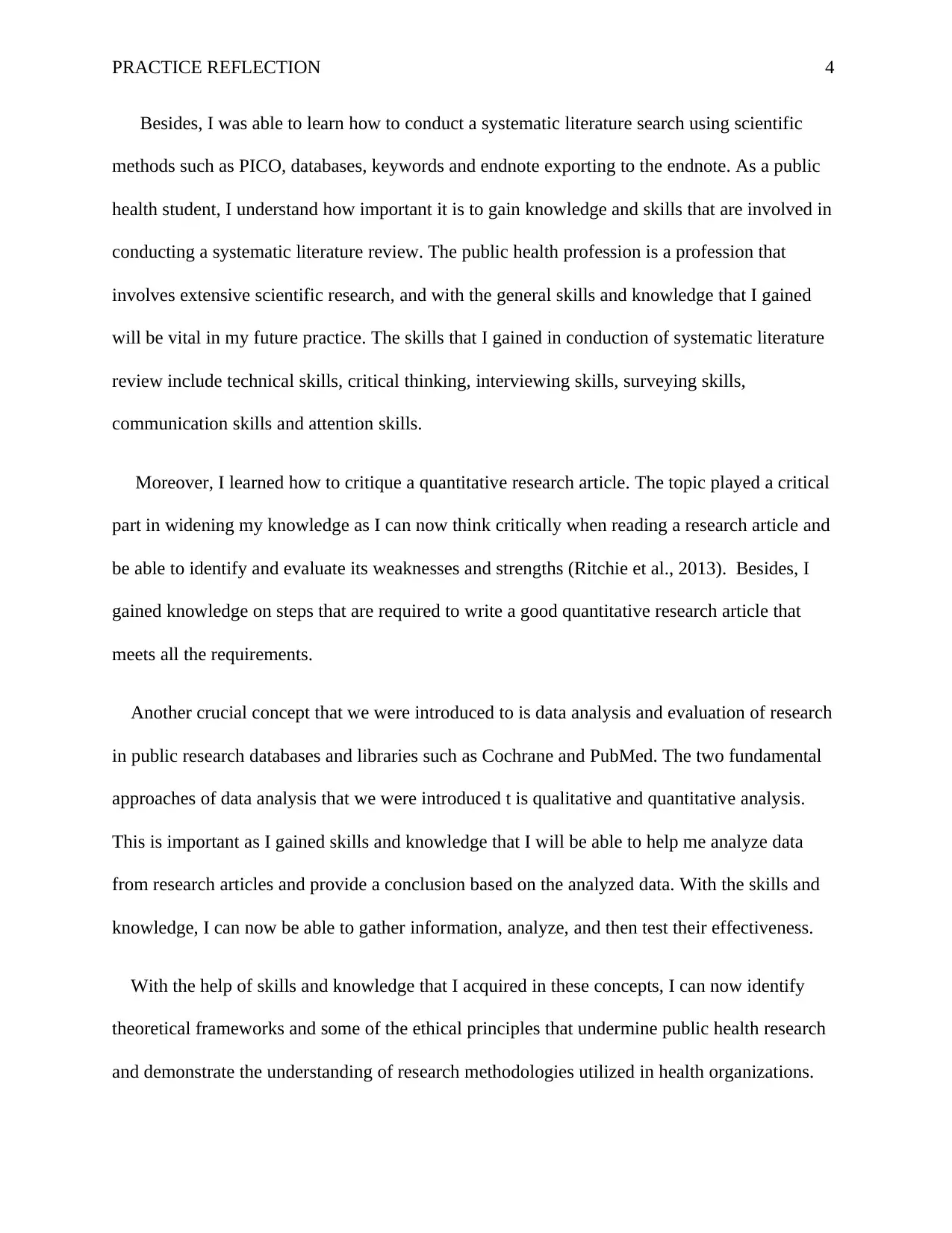
PRACTICE REFLECTION 4
Besides, I was able to learn how to conduct a systematic literature search using scientific
methods such as PICO, databases, keywords and endnote exporting to the endnote. As a public
health student, I understand how important it is to gain knowledge and skills that are involved in
conducting a systematic literature review. The public health profession is a profession that
involves extensive scientific research, and with the general skills and knowledge that I gained
will be vital in my future practice. The skills that I gained in conduction of systematic literature
review include technical skills, critical thinking, interviewing skills, surveying skills,
communication skills and attention skills.
Moreover, I learned how to critique a quantitative research article. The topic played a critical
part in widening my knowledge as I can now think critically when reading a research article and
be able to identify and evaluate its weaknesses and strengths (Ritchie et al., 2013). Besides, I
gained knowledge on steps that are required to write a good quantitative research article that
meets all the requirements.
Another crucial concept that we were introduced to is data analysis and evaluation of research
in public research databases and libraries such as Cochrane and PubMed. The two fundamental
approaches of data analysis that we were introduced t is qualitative and quantitative analysis.
This is important as I gained skills and knowledge that I will be able to help me analyze data
from research articles and provide a conclusion based on the analyzed data. With the skills and
knowledge, I can now be able to gather information, analyze, and then test their effectiveness.
With the help of skills and knowledge that I acquired in these concepts, I can now identify
theoretical frameworks and some of the ethical principles that undermine public health research
and demonstrate the understanding of research methodologies utilized in health organizations.
Besides, I was able to learn how to conduct a systematic literature search using scientific
methods such as PICO, databases, keywords and endnote exporting to the endnote. As a public
health student, I understand how important it is to gain knowledge and skills that are involved in
conducting a systematic literature review. The public health profession is a profession that
involves extensive scientific research, and with the general skills and knowledge that I gained
will be vital in my future practice. The skills that I gained in conduction of systematic literature
review include technical skills, critical thinking, interviewing skills, surveying skills,
communication skills and attention skills.
Moreover, I learned how to critique a quantitative research article. The topic played a critical
part in widening my knowledge as I can now think critically when reading a research article and
be able to identify and evaluate its weaknesses and strengths (Ritchie et al., 2013). Besides, I
gained knowledge on steps that are required to write a good quantitative research article that
meets all the requirements.
Another crucial concept that we were introduced to is data analysis and evaluation of research
in public research databases and libraries such as Cochrane and PubMed. The two fundamental
approaches of data analysis that we were introduced t is qualitative and quantitative analysis.
This is important as I gained skills and knowledge that I will be able to help me analyze data
from research articles and provide a conclusion based on the analyzed data. With the skills and
knowledge, I can now be able to gather information, analyze, and then test their effectiveness.
With the help of skills and knowledge that I acquired in these concepts, I can now identify
theoretical frameworks and some of the ethical principles that undermine public health research
and demonstrate the understanding of research methodologies utilized in health organizations.
Paraphrase This Document
Need a fresh take? Get an instant paraphrase of this document with our AI Paraphraser
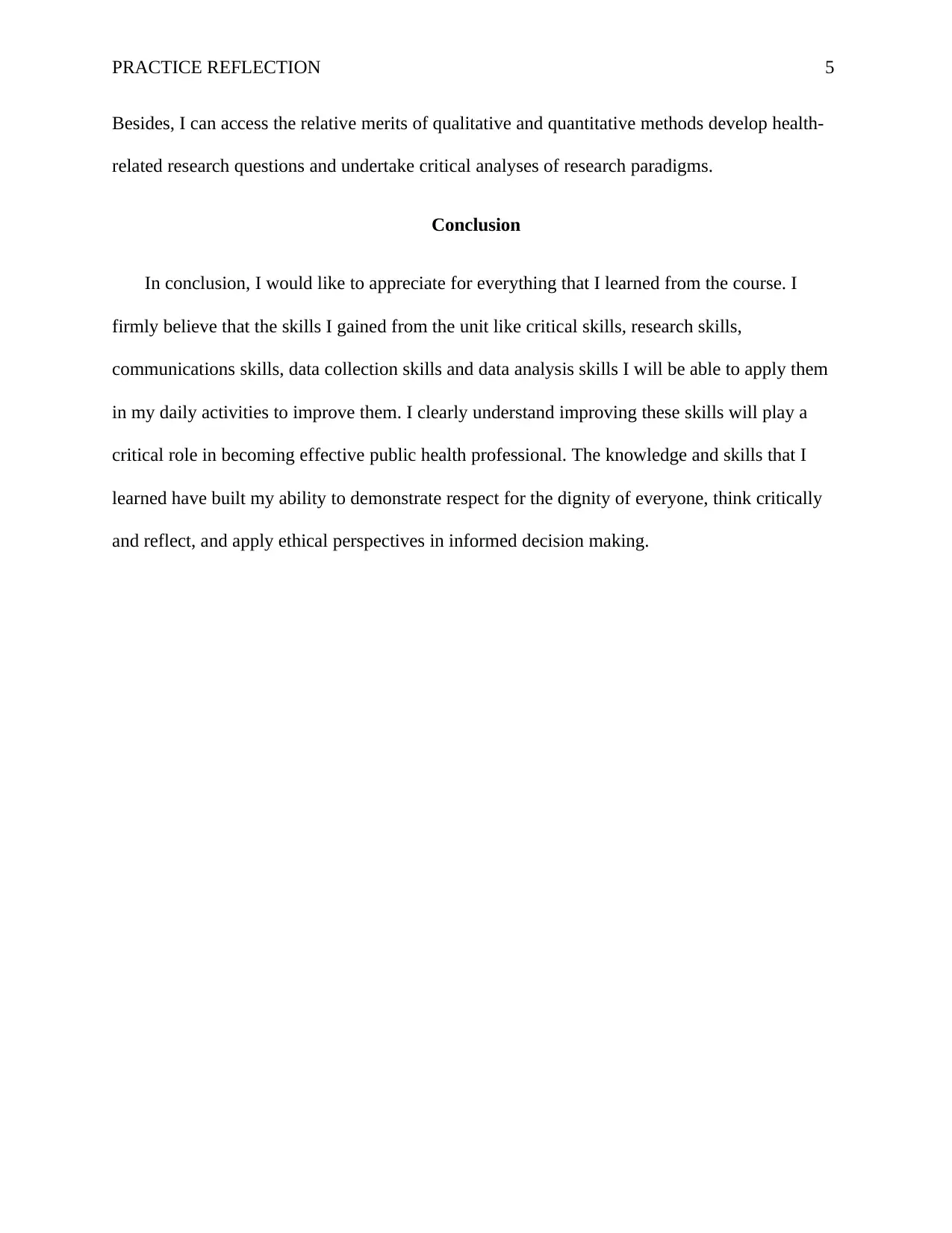
PRACTICE REFLECTION 5
Besides, I can access the relative merits of qualitative and quantitative methods develop health-
related research questions and undertake critical analyses of research paradigms.
Conclusion
In conclusion, I would like to appreciate for everything that I learned from the course. I
firmly believe that the skills I gained from the unit like critical skills, research skills,
communications skills, data collection skills and data analysis skills I will be able to apply them
in my daily activities to improve them. I clearly understand improving these skills will play a
critical role in becoming effective public health professional. The knowledge and skills that I
learned have built my ability to demonstrate respect for the dignity of everyone, think critically
and reflect, and apply ethical perspectives in informed decision making.
Besides, I can access the relative merits of qualitative and quantitative methods develop health-
related research questions and undertake critical analyses of research paradigms.
Conclusion
In conclusion, I would like to appreciate for everything that I learned from the course. I
firmly believe that the skills I gained from the unit like critical skills, research skills,
communications skills, data collection skills and data analysis skills I will be able to apply them
in my daily activities to improve them. I clearly understand improving these skills will play a
critical role in becoming effective public health professional. The knowledge and skills that I
learned have built my ability to demonstrate respect for the dignity of everyone, think critically
and reflect, and apply ethical perspectives in informed decision making.
1 out of 5
Related Documents
Your All-in-One AI-Powered Toolkit for Academic Success.
+13062052269
info@desklib.com
Available 24*7 on WhatsApp / Email
![[object Object]](/_next/static/media/star-bottom.7253800d.svg)
Unlock your academic potential
Copyright © 2020–2026 A2Z Services. All Rights Reserved. Developed and managed by ZUCOL.



![Reflection on Health Science Research: HLSC621, [University Name]](/_next/image/?url=https%3A%2F%2Fdesklib.com%2Fmedia%2Fimages%2Ftf%2F4796cf8c5158405d940afb0ee35afd4b.jpg&w=256&q=75)

